#yeah this is triggering
Text
George Karizaki and the Tragic Clown Paradox
(aka) The George Karizaki Dilemma — My George Character Analysis
WARNING: This essay goes into dark topics such as child abuse, trauma, and many other touchy and sensitive topics. Read at your own risk, basically. Also contains spoilers up to episode 48 of Revice.
Warning, again—sensitive topics ahead.
big thanks to @alpona for inspiring me to actually write and post this.
My Interpretation of the Inner Demon Reveal
Vulnerability is defined in the Oxford Dictionary as: “the quality or state of being exposed to the possibility of being attacked or harmed, either physically or emotionally.” George Karizaki is a character that uses humor to disguise vulnerability. On the surface he comes off as more of an unbothered-genius, or mad scientist archetype. He works on what he likes, moral or not, all with an infuriating cocky-smile on his face. But humor isn’t the only thing George uses to hide his vulnerabilities, the very mask of ‘mad scientist,’ or a ‘villain’ caricature/persona is one of the other substantial ways George disguises his own traumas, fears, and pains. At the heart of it all, George cannot be analyzed without being placed in the “Tragic Clown Paradox.” Or— the ‘sad clown paradox’ as wikipedia calls it.
Wikipedia defines said paradox as: “The contradictory association between comedy and mental disorders such as depression and anxiety.”
More specifically, the link between humor and trauma. The paradox here, of course, being the fact that clowns—who are associated with laughter, fun, etc.—are actually the saddest or perhaps loneliest individuals in the room.
This analysis seeks to examine George Karizaki as a character: how he’s being presented, his type of humor, and most importantly—how it all relates to his trauma.
First on the list of analysis then, is the clown archetype and why I think George fits particularly well into it, and what that might mean for the character. In the article “The Great Comedians: Personality & Other Factors,” Samuel S. Janus states:
“The world of theatre has always found meaningfully symbolic the alternate faces of comedy and tragedy. Historically, court jesters were tragicomic figures— the embodiment of the bittersweet of life. Among the oppressed, the role of social critic has been the comedian's forte. Freud indicated that humor is a release for anxiety, to quote Abe burrows: ‘The comedian must practice his comedy in order to avoid destroying himself.’ Jack Carter, another leading humanist, says: ‘the funny part, the laughter, is given to the audience, but the comedian is left with the bitter dregs.’ Comedy has been described by a leading theologian as: ‘The ability to laugh at one’s own tragedy.’”
This is a particularly powerful section looking at the role of the tragicomic—the jester, the clown; and just how entwined with tragedy said comic is. Now, examining George’s portrayal in the show, fifty-one seconds into the first episode of Revice we are introduced to George first via his voice-over explanation about the Giff stamp. Then he brings up the idea of fighting demons with demons and with a snap of his fingers he brings up Daiji’s profile. Here we see George as a confident scientist. He obviously has a plan and knows what he’s doing. All, as stated previously, with a cocky-smile on his face.
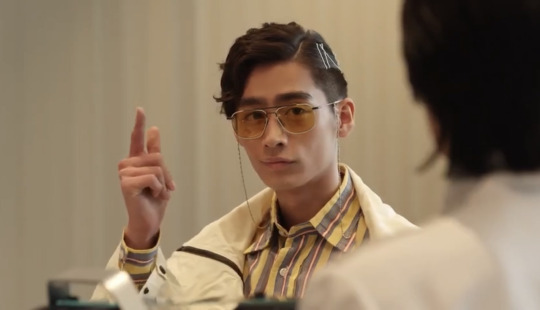
At Daiji’s coronation he cuts off Hiromi and pushes him humorously out of the way, saying he’s ‘taking too long.’ (This is notably also the first episode where we hear mention of his father and/or his father’s scientific legacy.) During the entire attack at the coronation, George is shown to be one of the only people not panicking. He’s rational and level-headed, even warning Hiromi not to try using the vistamp because it would be too strong for him. But then refusing to intervene or do anything more, letting Hiromi go through (and fail) at transforming. Simply stating: “See?” when things go wrong. This—from the standpoint of the audience, is also quite humorous.
George takes on this theatrical jester archetype throughout the entirety of the series, sarcastically commenting on the sidelines as things take place within the central plotline. Like with Hiromi’s failed henshin. In “Fools are Everywhere” Beatrice Otto takes notice that ‘It is the nature of jesters to speak their minds when the mood takes them, regardless of the consequences.” In fiction, and real life, jesters employ a variety of skills. Such as storytelling. In fact, the modern term derives from gestour, or jestour, Anglo-Norman (French) meaning ‘storyteller’ or ‘minstrel.’ (Wikipedia) Jesters have a privilege of mocking/stating the truth to those in power (King) and being able to get away with it. George Karizaki is shown (like in episode 1) to mock, narrate, or comment on a situational folly or irony—again, such as Hiromi’s failed transformation.
There are, of course, other notable instances of George’s jester antics—such as in episode 2, when Hiromi is informed he’s been demoted. Stating: “Your disgraceful failures to protect our Vistamp research labs AND inauguration ceremony have led you here.” So truthful and mean that you, as the audience, can’t help but feel bad and be amused. But instead of ending it there, George puts on that mocking smile of his and says in English, “Don’t mind, Hiromi.”

George, like most jesters, are passive commentators rather than active forces within the narrative. They spectate. In fact, the most active thing George does is create vistamps to be used, which is barely, if ever, shown on screen. Yet somehow George still manages to manipulate and dictate main storyline events. Often working as the catalyst for something to happen in the episode. Such as when he gives Daiji a henshin device, or when he sticks a tracker on something stolen from their base in episode 14/15.
Moving on to his sense of humor, George’s humor is a mix between self-enhancing humor that: “Involves a generally humorous outlook on life, a tendency to be frequently amused by the incongruities of life, and to maintain a humorous perspective even in the face of adversity,” (Like George at the coronation in episode 1), and Aggressive Humor which “relates to the use of sarcasm, teasing, ridicule, derision, ‘put down’ or disparagement humor.” Both are used to enhance the self, and the second is used to enhance the self at the expense of others, specifically.
In Scott Kaufman’s and Aaron Kozbelt’s study, “The Tears of a Clown: Understanding Comedy Writers” they look at these types of humors and found self-enhancing humor to be positively correlated with social support and optimism, suggesting an optimistic outlook on life is closely linked to using humor for coping, perspective taking, and emotional regulation. On the other hand, they found aggressive humor to be positively correlated with self-report measures of hostility and aggression. We have seen George employ both kinds of humor throughout the show. Especially aggressive humor. This shows that George, as a person, is someone who uses comedy to cope and emotionally regulate himself, aka: He builds himself up by taking others down. I stated at the beginning that George uses humor to hide vulnerability, and to give himself a sense of control. As George—though it might not be obvious at first glance—is someone who hates loss of control, as it puts him in a vulnerable position and reminds him of his past trauma, which I’ll get to in a minute.
Above is a video of George putting on his Villain persona in response to Hiromi lashing out at him
Janus states that, “there appears to be an awareness on the part of the audience of the relationship between humor and anxiety. Consequently it would be reasonable to assume some awareness of the fact that comedians are very anxious and often depressed people. (...) Humor, then, can be seen to be especially applicable in situations in which the individual feels himself to be powerless.”
Power, powerlessness, control, and lack of, are all important elements of George Karizaki’s character and the clown mask he uses to cope with his past and his present. In Janus' study on the relationship between humor and anxiety, he found that the early lives of all the subjects were marked by suffering, isolation, and feelings of deprivation; and I quote:
“Humor offered a relief from their sufferings and a defense against inescapable panic and anxiety. The presence of these same needs and ears almost universally accounts for the success of these particular individuals as humorists. The fact that humor is a language of protest to mitigate their anxiety and permits them to function. (...) It is felt that comedians are able to convert their rage from physical to verbal assault and that for many their comic routines are a form of acting out. (...) They (comedians) are keenly sensitive people who have an uncanny perception of the needs and fears of their audience.”
Losing his father at such a young age and with no information about a mother, other than the mention of her not being around/gone, I think it is safe to assume George grew up an orphan without parental role models in his life. But not having parents is not George’s only trauma.
(And here’s where my take becomes hot ….lol)
George was forcibly given his father’s inner-demon as a child. This is obviously a metaphor for the passing down of generational trauma. It is also a form of child abuse. If we examine the facts, which are: (1) the father inserted his demon into George’s body without his consent, (2) this hereby violates George’s sense of self/his bodily autonomy, (3) as stated above, it’s child abuse. You don’t use a kid as an experiment and violate his control over his own body and not have that qualify as child abuse. George had to have been about 4-5 years of age at the time. That’s messed up. Though he might not recognize it subconsciously, this is another reason George hates lacking control.

He’s already had things taken from him (i.e his parents) and things done to him (inner demon) all outside of his control. Then he had to grow up in that environment of deprivation and abandonment, where all he had left was his father’s inner demon and a legacy to live up to. This is also why Geeorge has the tendency to mask as a villain when confronted/put into an uncomfortable situation. It’s self-protection. “People lash out so that they can reject before they get rejected or abandoned. It is a way for the person to feel more in control, which makes them feel safer.” (‘Why do people lash out’ by Dr. Monocle Borschel) Some people with trauma lash out because they go into fight or flight mode when they feel threatened.
To George—being vulnerable is putting himself out to be exploited. So he masks behind aggressive humor and villainy instead.
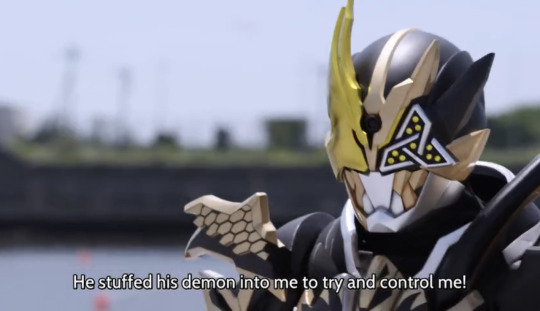
Now, onto George Karizaki’s dilemma.
One of the ways the George inner-demon reveal can be read (aka the way I read it) is as a metaphor for CSA. (Child Sexual Abuse.) How the scene is shown, the translation, and the fact that George’s bodily autonomy is being violated by his father, is why I came to this conclusion. This would also further explain George’s unusual sexual-coded interest in older men/father figures/authority figures. Victims can seek out the same type of abusers in order to have “control” over their own situation this time around, ergo “winning.” Though it never quite does work out that way. Either way, basically, if George is flirting/making the advances, then he has the control.
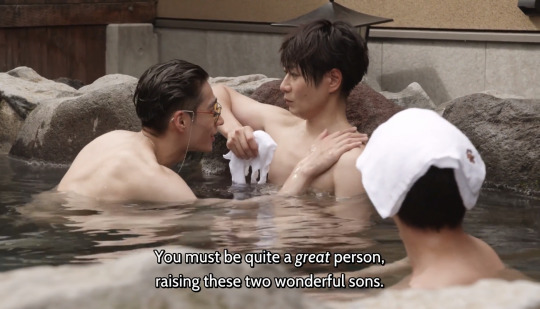
All throughout the show George is usually the one to initiate physical contact with others, not the other way around. And when it is the other way around? George has never once reacted positively, instead forcibly removing the hand/touch from his body.
Of course, this might’ve just been the actor being silly/doing something he finds amusing, for when he does things like flirting with the Igarashi father in episode 8 at the hot springs. But it still shouldn’t be ruled out imo.
One of my first questions at George's inner-demon reveal was: “How does this differentiate from the intergenerational trauma passed down to Ikki from his own father?” Ikki’s situation (mostly with Vail) is often seen as a physically and emotionally abusive relationship. Ikki literally uses himself as a shield to protect his other siblings from his father’s inner demon. Vice, Ikki’s own inner-demon, is modeled after Vail, his father’s demon. Vail caused Vice to be created. I could wax poetic on this forever. But in examination and comparison to George’s situation, I found that the difference was in the actions the fathers took. Genta failed to protect his family from his inner-demon and hurt them, both physically and emotionally. But, George? George’s sense of bodily autonomy is being violated. His father, in fear of losing his son, decides to do something to his body that can never be undone; and he does it in his sleep. All without George knowing or realizing what’s going on.
The entire situation reads to me as CSA.
That’s the difference in the traumas being passed down; because unfortunately, it is a common fact for victims of CSA to become perpetrators of it when they’re older. Once again it’s about revisiting the trauma but from the winner’s side. Which is a disgusting thought process/reasoning, but that is the underlying motive. Now, was his father abused that way? As the audience, we can’t be sure. We know from separate Revice releases that the father, Masumi, worked as a scientist in a position lacking power—but that’s all we really know about his side of the story. The only thing that hints at it being like that is the knowledge of this being an intergenerational trauma being passed down from father to son. Literally, the same inner demon. Plus, the fact that it is being passed down from body to body.
This is George’s essential dilemma—how he should view his father who was a good dad in most aspects up until the inner-demon insertion, and abandonment.
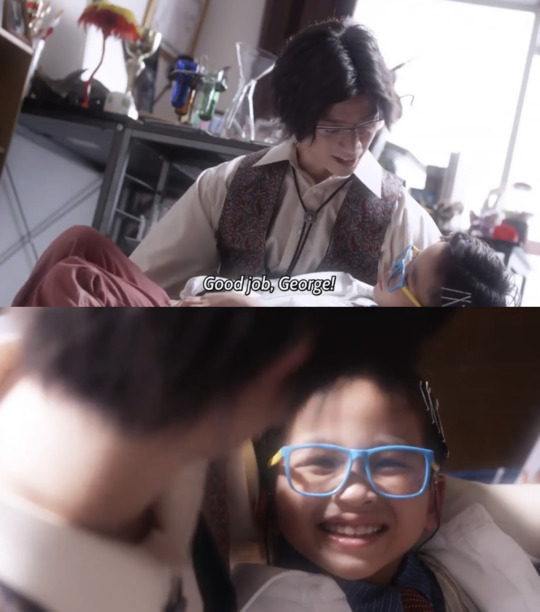
This is why George states that it would be easier to forgive his father if he were really dead.
The entire scenario does nothing but fill George with turmoil. How can he reconcile these two facts? The good and loving memories versus the abandonment and bodily autonomy violation. The bad things should make his father irredeemable, unforgivable, evil. But he was still George’s father. One who gave him a majority of good memories when he was around. The situation here isn’t black or white but a complex gray area.
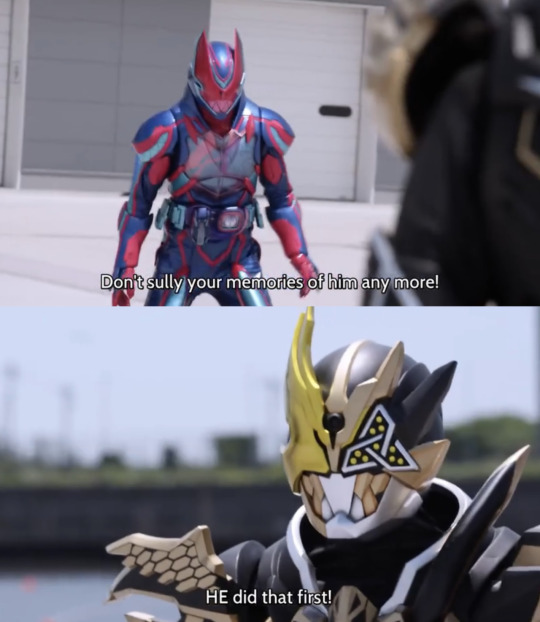
Even Chic, George’s inner demon, shows aspects of this: George and his father’s love for science (good)—but twisted into something ugly, and, humor—George’s way of coping. A perfect mix of the trauma and how it both drives George/causes him to react a certain way (masking, etc.). That’s what Chic represents. A trauma inherited from his father.
So, George Karizaki is a “tragic clown paradox” because of this gray situation he finds himself trapped within. It’s a lose-lose. The jester’s met his match. Humor finally wasn’t enough to mask his pain. So George did the next best thing: he became the villain. (Juuga)

A few things to note now that we’re coming to the end of my essay: (1) this situation reminds me of two other things—Perks of Being a Wallflower (Charlie), and Eliot’s situation in Mr. Robot. In BOTH cases (spoiler) the MC has been a victim of CSA by someone close and very dear to their heart. In Perks it’s by Charlie’s favorite person—his aunt, and in Mr. Robot it’s by Eliot’s father. Both Charlie and Eliot repressed these memories and went on remembering their abusers as people they really loved and who really loved them. Yet, once they remember what happened to them…sh*t hits the fans. Here’s a clip from Perks of the scene where Charlie remembers/finds out what happened:
WARNING: The videos below might be triggering, watch at your own caution.
youtube
Here’s a clip for when Eliot finds out:
youtube
In both, finding out had (obviously) detrimental effects on them. But even before that, their trauma is shown subconsciously. For Eliot, his personality split in order to protect himself. For Charlie, his depression and suicidal ideation. The same can be said for when George finds out. George literally slowly loses his mind, with the catalyst of his father dying adding to previous stress, and instead tries to destroy his father’s legacy by attacking his friends. All so that he can feel more in-control. All so he can feel he has power over his father. So yeah, Charlie and Eliot’s stories reminded me a lot of George’s, which only strengthened my previous assumption of his inner-demon metaphor being about CSA trauma.
Other things to note: (2) George uses touch to manipulate others, often initiating contact when trying to get someone to do something. Such as an arm over shoulder. For George, this can show that to him, touch equals power and control. Especially over others. (3) I think this is one of the reasons why George works out a lot. He worked out enough so that if someone touches him, he can physically remove the touch himself. No more letting others have control over his body without his consent.

#yeah this is triggering#yeah its totally my interpretation of the inner demon reveal#yeah the writers probably didn't mean for it to be interpretated this way#but I did so 🤷🤷🤷🤷🤷🤷#I hope this analysis at least explains my thought process somewhat#I know this is a hot take but its the way my brain saw the scene#and it's been like that ever since#(clown noises)#kamen rider revice#kronthescoup#ikki why is ur demon so cringe#revice analysis#george karizaki#george karizaki analysis#revice#kr revice#revice spoilers
11 notes
·
View notes
Text

#titanic#stock market#logitech#oceangate#usually I Do Not Do things like this but uh. Yeah .this is prrrroabbly going to end up triggering the shit out of someone maybe#The stocks did actually plummet though I think but no lawsuit
34K notes
·
View notes
Text

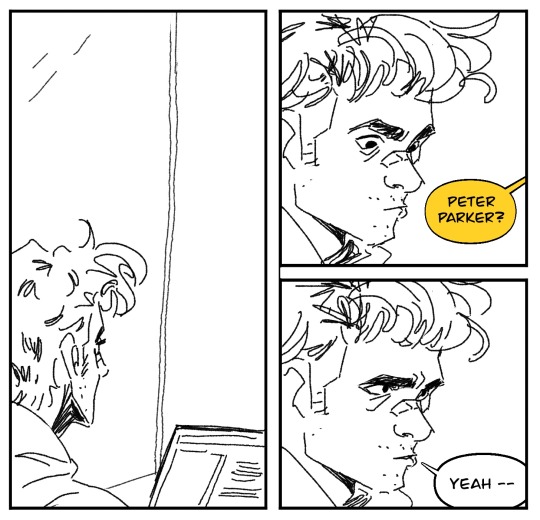
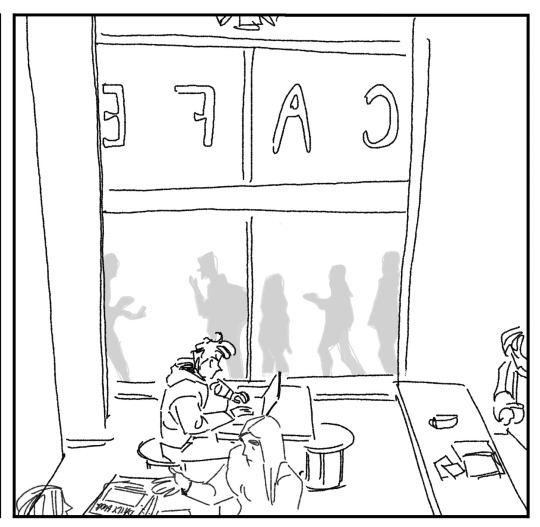
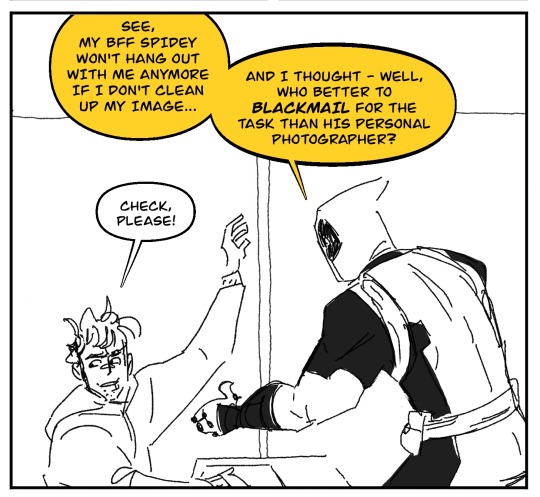
spideypool but it's a comedy of errors
#peter parker#wade wilson#spider-man#deadpool#spideypool#peter is going to have a long hard look at himself in the mirror about his spidey sense not triggering#(you know what else is long and hard—)#wade: see that metro bus over there?#peter: yeah....#wade: i save. you film#peter: save it from wh—#wade pulling explosives out of his pockets: grab your camera babe we're on a time crunch here#who will write this for me#mine
5K notes
·
View notes
Text
hey btw if you're in the USA at 2:20 p.m. ET on Wednesday, Oct. 4, they're testing the emergency broadcast system. your phone is probably going to make a really loud noise, even if it's on silent. there's a backup date on the 11th if they need to postpone it.
if you're not in a safe situation and have an extra phone, you should turn that phone completely off beforehand.
additionally, if you're like me, and are easily startled; i recommend treating it like a party. have a countdown or something. be surrounded by your loved ones. take the actions you personally need to take to make yourself safe.
i have already seen mockery towards any person who feels nervous about this. for the record, it completely, completely valid to have "emergency broadcast sounds" be an anxiety trigger. do not let other people make fun of you for that. emergency sounds are legitimately engineered to make us take action; those of us with high levels of anxiety and/or neurodivergence are already pre-disposed to have a Bad Time. sometimes it is best to acknowledge that the situation will be triggering for some, and to prepare for that; rather than just saying "well that's stupid, it's just a test."
"loud scary sound time" isn't like, my favorite thing, but we can at least try to prevent some additional anxiety by preparing for it. maybe get yourself a cake? noise cancelling headphones? the new hozier album? whatever helps. love u, hope you're okay. we are gonna ride it out together.
#watching ppl go from being like ''support neurodivergent ppl~~!"#to being like ''if this is going to give u a panic attack ur fuckken stupid''#like..... gets me#yeah man. i know im going to be triggered by it . in the old fashioned term. it is GOING to give me a panic attack. it's pretty much certai#and i shouldn't have to tell u about what i have survived for you to be okay with that.#you can just trust that i ALSO don't want me to react to it. i'm not gonna be having a FUN time.#dismissing that bc you think it's stupid.... like is the whole problem.#these sounds are workshopped by entire teams of people to get you to pay attention and move quickly.#they arent meant to be fun and exciting.#OBVIOUSLY it's gonna set ppl off.#but yeah there's something so fuckken demeaning about ppl being like. well that trigger isn't valid bc u haven't undergone X#dude i have ptsd bc i was abused as a child. like plain and simple. the fact im 30 and afraid of the dark tells you how bad it was.#i shouldn't have to ask u for permission to be mentally ill.#the reason it's a fucking disorder and not a fucking choice is that I DO NOT CONTROL IT.#like how is it any different from when ppl are like ''oh public speaking isn't that scary'' like FOR YOU#for YOU this isn't scary. now if i could fucking eat my own amygdala...
10K notes
·
View notes
Text

i’ll uncanny YOUR valley bitch
#okay it’s not really uncanny#i didn’t wanna spook people for realsies#but yeah anyway in my head#shadow knights trigger the uncanny valley effect :]#weird guys !!!#lyrics from im always walking as somebody else#by american murder song#aphmau#minecraft diaries#aphblr#mcd#dante aphmau#gene aphmau#if you see mistakes no u don’t#scribble post
608 notes
·
View notes
Text
i love that crowley was about to pass out when he had to shot at aziraphale. i love that aziraphale couldn't come up with anything more threatening than "i'll never talk to you again". they're both idiots and down bad for each other and if yall think they'd fight each other yall r just dumb. if they'll ever go up against each other it's gonna end w both of them (but mainly crowley) shaking and crying and throwing up on the floor. trust me on that.
#cant get over how CROWLEY'S HANDS FUCKING SHOOK ON THE TRIGGER I CAN'T GET OVER THE LOOK ON THEIR FACE I CANNOT FUCKING GET OVER HOW MUCH#TRUST AZIRAPHALE HAD IN THEM I VANT GET IVER THE FUCKING 1941 AND DONT EXPECT ME TO#but yeah anyway they'll never fight each other they're literally pathetic for the other come on now#good omens#good omens s2#azicrow#crowley#aziraphale#aziracrow#ineffable spouses#go season 2
2K notes
·
View notes
Text
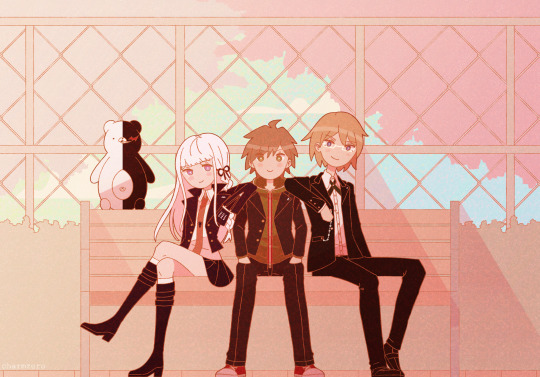
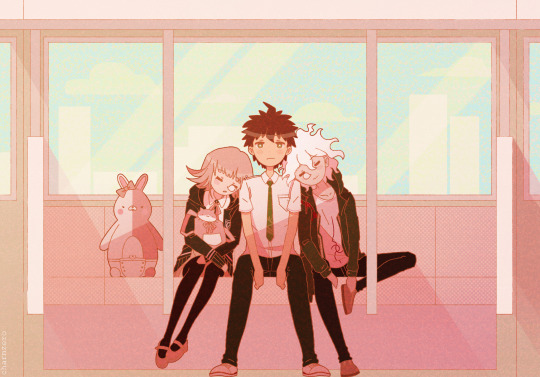
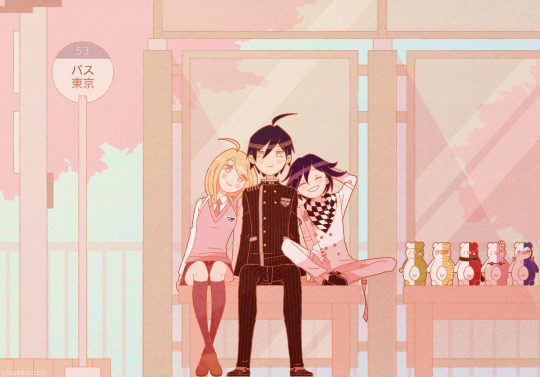
protagonist, deuteragonist, antagonist
#danganronpa#trigger happy havoc#goodbye despair#killing harmony#kyoko kirigiri#makoto naegi#byakuya togami#chiaki nanami#hajime hinata#nagito komaeda#kaede akamatsu#shuichi saihara#kokichi ouma#monokuma#monomi#monokubs#yeah I know the caption doesn’t match the characters exactly but it looks cool okay
10K notes
·
View notes
Text
wait hold on. before i forget.
i had this dream abt sesame street doing a collab with some company that made sleep accessories and beds, and the Bert and Ernie one was this twin bed perfectly separated in the middle with one side themed after each of them.
for the commercial it showed them sleeping in it, but they were lying like this;
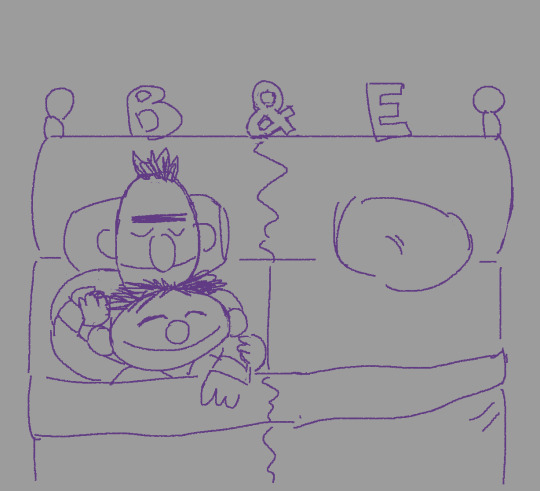
#it was the only dream i remembered from that night. it was so cute#sesame street#bert and ernie#unfortunately i think the thing that triggered that dream was me seeing that -yeah we nutting this month- post#since it has ernie in it.#yes their arms are positioned weird but it was like that in the dream. theyre muppets. no bones.#tedpost#tedart#tedreams
1K notes
·
View notes
Text

huh. there's something on my face
#i kinda hate this#dont look at it too long lol#the silt verses#tsv#tsv 39#tsv fanart#the silt verses fanart#tsv angel#glass angel#the silt verses glass angel#perspective#mirror#mirror art#podcast fanart#tsv podcast#lineless art#lineless#pale#semirealism#semi realistic#blood#a little#tw blood#sure yeah ill trigger tag that#art#my art#fanart#digital art#digital painting#medibang
348 notes
·
View notes
Text
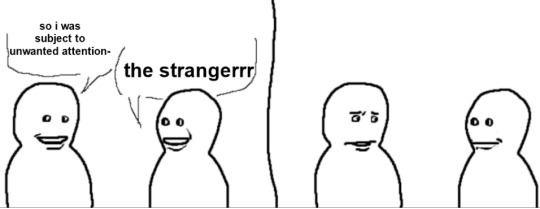
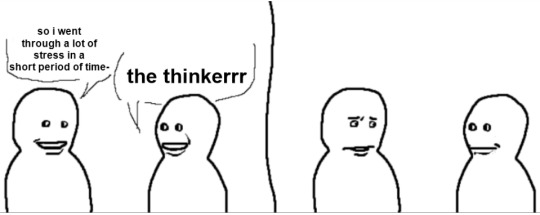
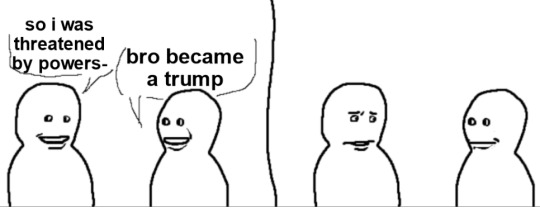
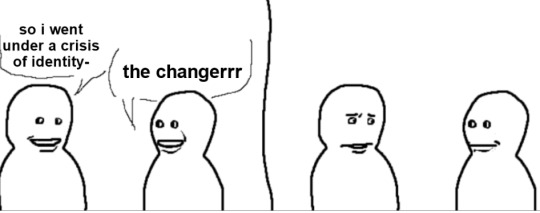
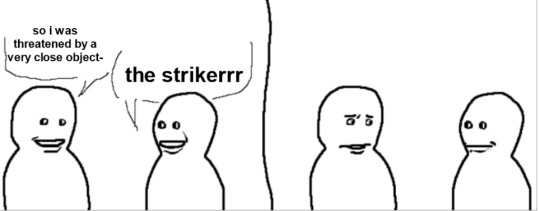
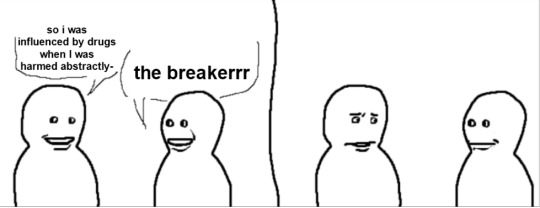
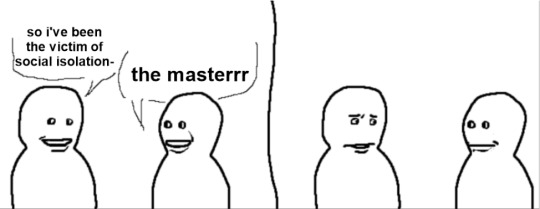
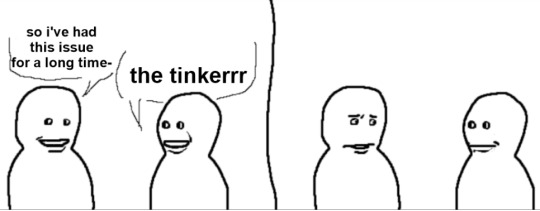
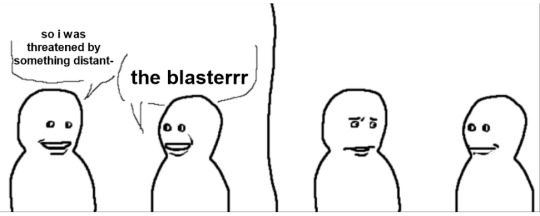
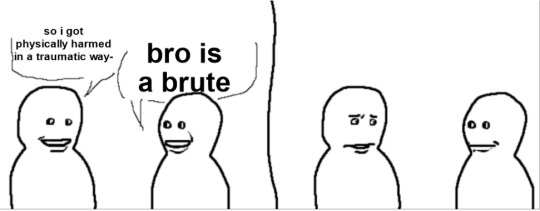
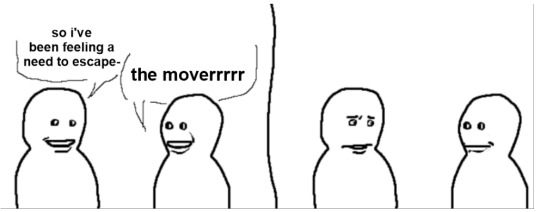
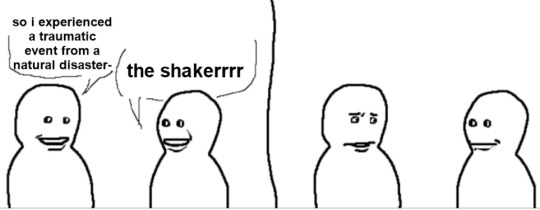
The triggerrrr
#worm#wormblr#yeah I just copied some of these triggers word for word from the wiki#but hey what are you gonna do about it
320 notes
·
View notes
Text
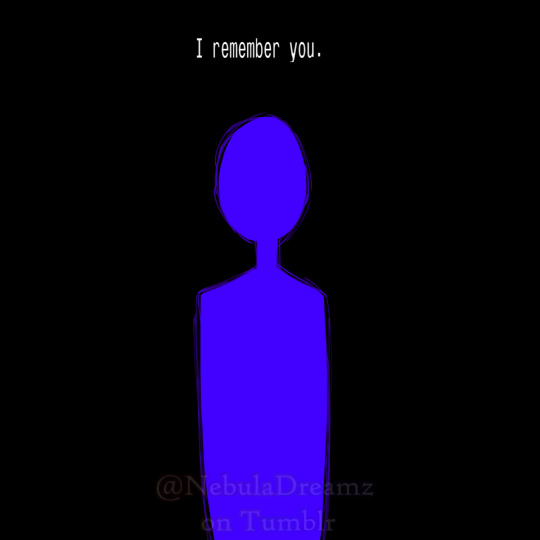
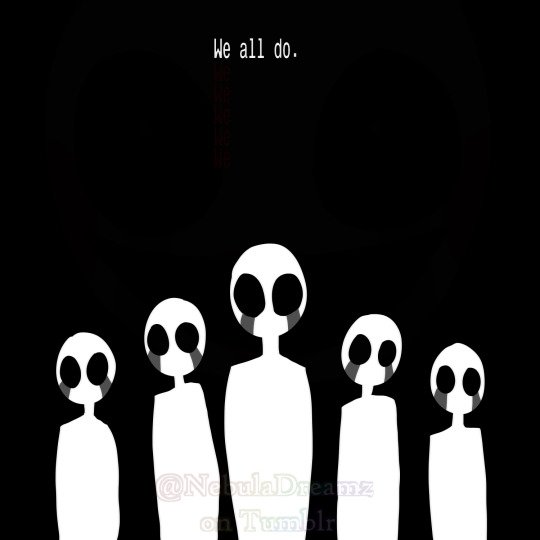
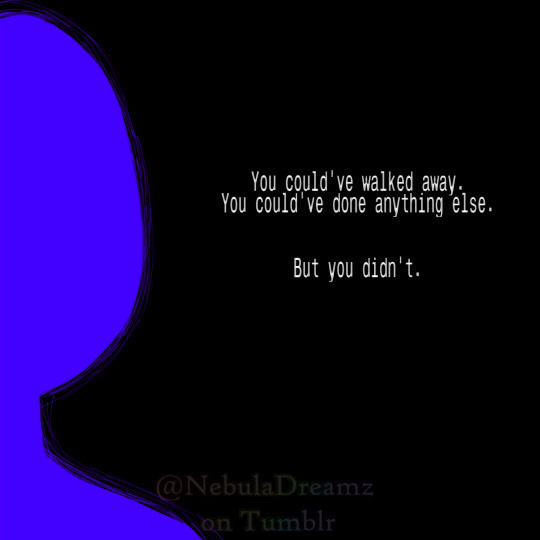
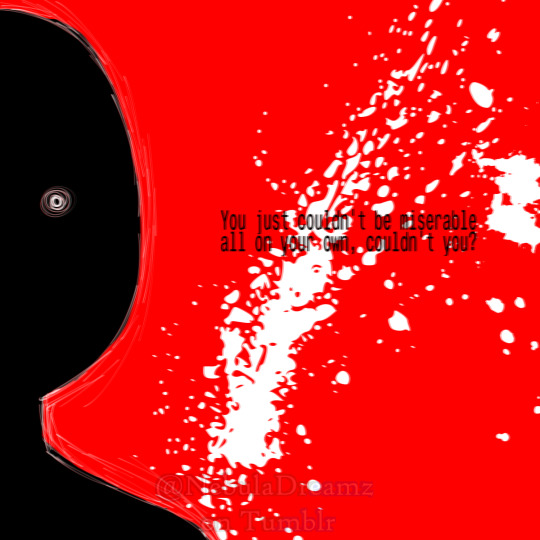
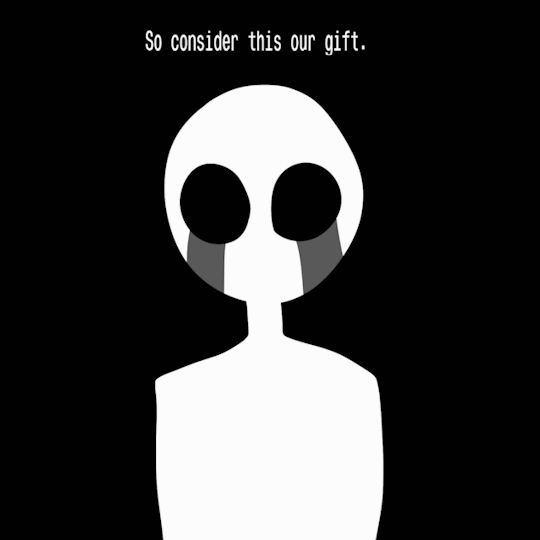

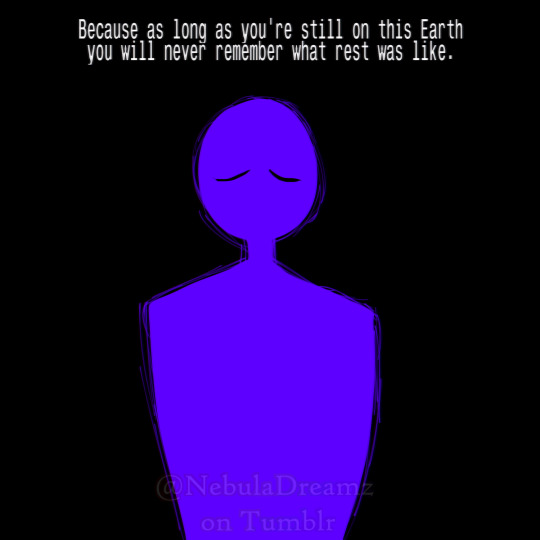


#nebula art and doodles#fnaf#fnaf william afton#fnaf cassidy#in honor of the movie coming out soon#and also something i've been thinking of#tw scopophobia#cw scopophobia#tw blood#cw blood#im not. sure what else i should trigger warn tag this as probably gore but maybe not#anyways i bullshitted this in. like an hour or so i decided halfway through i'd animate a little bit to get used to shit again#BUT YEAH THUMBS UP I LOVE FNAF AND SOME PEOPLE FORGET THAT IT'S GENUINELY FUCKED UP WHEN THINKING OF THE IMPLICATIONS#also was gonna animate the second to last frame of the various springtrap personas afton has but#i wasn't in the mood sorry springtrap lovers#five nights at freddy's#fnaf fandom#?? i guess
829 notes
·
View notes
Text
strongly dislike the idea that harry would become an auror after the war. give the boy a break. he deserves to live in a little cabin in complete isolation for a few years to discover himself
#he only fought voldemort and saved the wizarding world because he had to#because he was groomed to#not because he wanted to#do i think he possibly could have started auror training because thats what was expected of him?#yeah sure#do i think it would then immediately trigger ptsd and his friends urge him to quit?#very much so#give him a break to get to know himself#he shouldn't have to fight anymore#harry potter#hjp#harry james potter
283 notes
·
View notes
Text
ummm….. so. the mondoblr server made a joke, and i liked it a little too much.
the kiyotaka ishimaru iceberg!!
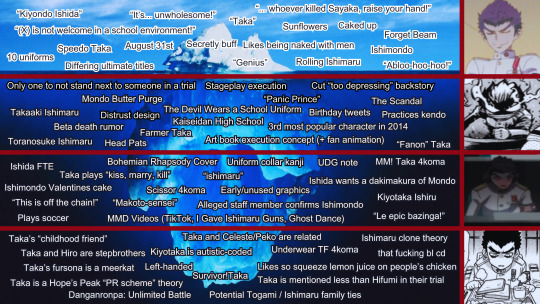
of course, i wasn’t the only one who worked on this. big thanks to @pompadorbz @chinchillasinunison @mini-mecha-cowboy @cryzono and @ecogirl2759 for all the help, whether it be contributing entries or finding sources!! we had a ton of fun putting this together, and i hope you guys like it!
reblogs are greatly appreciated because all of these lovely people (and i) put a lot of work into this!! they deserve it!!
(under the cut will be a link to the document with all the entries and some links to sources for most of them. HUGE thanks to eco for popping the absolute fuck off and finding all these links for us!!! (and thanks to mark and @panicuriprince for helping us out towards the end!))
#my mom seeing me typing away on my laptop: are you doing homework??#me who's been working on this iceberg for the past few hours: uh... yeah!#anyways. i love mondoblr server#ya'll are so cool for helping me with this dumb idea.#danganronpa#danganronpa trigger happy havoc#kiyotaka ishimaru#kiyondo ishida#ishimondo#lots of this info has to do with the ishimondos so...#danganronpa meme#danganronpa shitpost#ramblepuff#also what a strangely fitting thing to post on this account’s 2nd birthday
381 notes
·
View notes
Text
When the one piece is real

#danganronpa trigger happy havoc#danganronpa#makoto naegi#kiyotaka ishimaru#mondo owada#aoi asahina#byakuya togami#chihiro fujisaki#leon kuwata#yasuhiro hagakure#celestia ludenberg#im emotionally attached to Franky Mondo#he looks like a lizard#yeah i struggled with hiro's hedgehog hair#its not meant to look amazing its ok#that celeste tho 💀
287 notes
·
View notes
Text
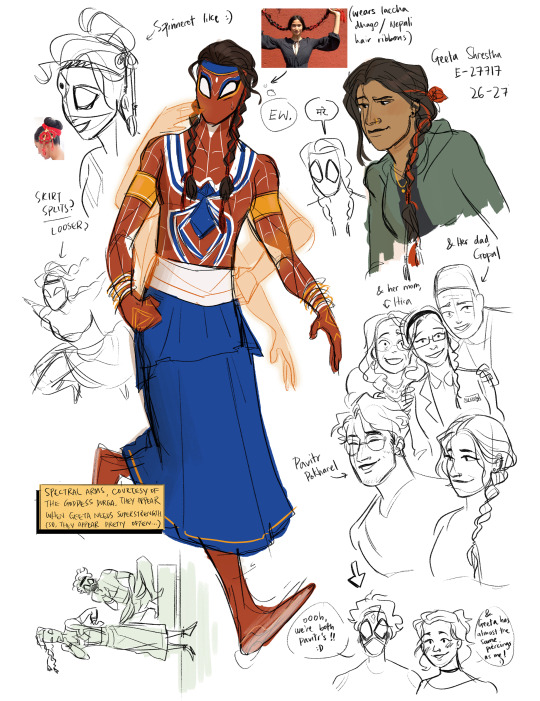
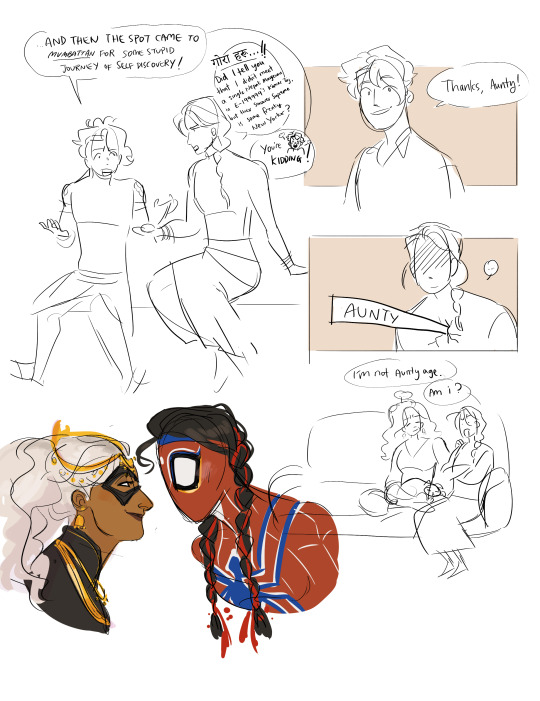
i deserve a spider-woman nepal..... miles doesn't have to be the only teen spider with a terrible bisexual mentor (enter my own sketches of the world's most annoying spiderperson, who i fling towards pavitr, complete with a design that's subject to change)
#geeta methodically puts on all her jewelery before going out as spiderwoman <3 u cant fight crime if u are not cute#spidersona#of sorts? i think but everyone should have expected this from me. there was no way sony was going to give me spiderman india#and not receive spiderwoman nepal (THE KATHMANHATTAN JOKE IS TOO EASY) in response#im tackling south asian unity one spidersona at a time!#pavitr prabhakar#spiderman#my art#also ofc one specific mention to demigod-of-the-agni who inadvertently triggered my actual posting of geeta#who was just supposed to stay in my psd files forever.....#mythic mumbattan au my beloved. hindu mythology my beloved. genuinely so so cool to see and it enabled me being self indulgent on this blog#for some extra context: im very much still workshopping her and me and my nepali friend were drawing her tgt#as in she would say something and i would hurriedly scribble/sketch it down#and then i kept kinda building on it. ofc i could not resist being inspired by the comics noirverse#so here she's also gifted her powers by a goddess (durga!!!!!) and almost works w her like a much less deranged moon knight. yeah...#don't look too closely at these pls . the design/sketching/etc is kind of everywhere#edit: forgot to adjust colors so theyre up again and a little more vibrant nyeow....
675 notes
·
View notes
Text
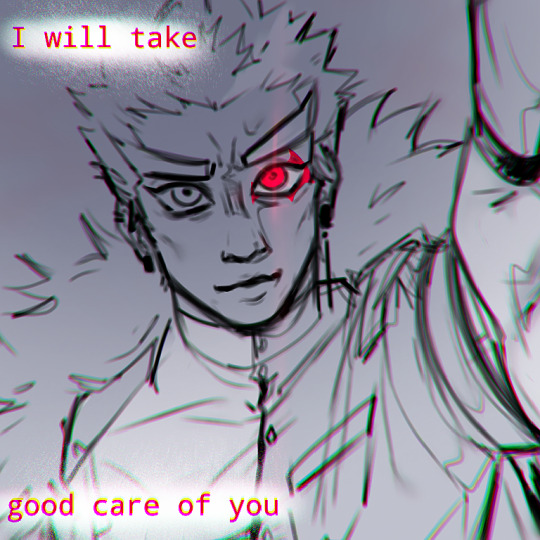

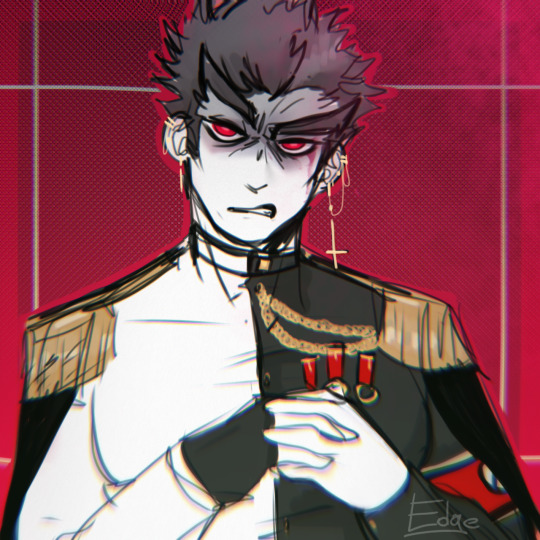
𝚁𝚎𝚍 𝚎𝚢𝚎𝚜 𝚕𝚒𝚔𝚎 𝚊 𝚍𝚎𝚖𝚘𝚗
#The devil in a school uniform for real#kiyotaka ishimaru#ishimaru#mastermind ishimaru#danganronpa#mastermind au#my art#edge's scribbles#mastermind kiyotaka#dr1#dgr#trigger happy havoc#dangan ronpa#dr1 kiyotaka#yeah no Mondo this round but you'll get more of him later♡#doodles#sketches#also can you tell i'm obsessed with Crazy by Jake Daniels
688 notes
·
View notes